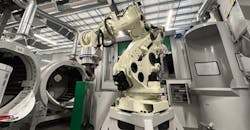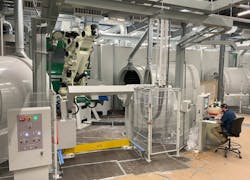Doncasters Precision Castings in Groton, CT, recently commissioned a fully automated shell line – a production process for manufacturing resin-bonded sand shells for metalcasting – and described it as “a major milestone” for its current improvement program and its long-term strategy. Three high-precision, six-axis robots are managed using the IC-Crystal Shell Management System – which tracks material and equipment conditions as well as environmental controls, increasing production capacity and improving casting quality and operational reliability.
The Connecticut foundry is an investment caster pouring vacuum-melted nickel and cobalt based superalloys for parts up to 45 in. (1.4 m) diameter by 30 in. (762 mm) high, with pour weights of up to 1,000 lbs. (454 kg.)
To date, 48 molds across six part families have been validated in the new system, according to Doncasters.
The $13-million capital investment adds 17,000 sq.ft. of production space to the foundry and introduces new automation and environmental control systems.
The IC-Crystal Shell Management System, developed by VA Technology, is a software program used to monitor and manage shell manufacturing, providing oversight for all aspects of the process. It provides real-time and historical data logging, part tracking, and Key Process Variable monitoring with configurable alarms.
“Our new fully automated shell system isn’t just a machinery upgrade—it’s a strategic leap forward,” stated Mike Looney, the foundry’s general manager. “This investment dramatically enhances our efficiency, precision, and capacity, enabling us to take on more complex, high-volume aerospace products. It positions us to meet rising industry demand and deliver unmatched quality to our customers around the globe.”
The former shell system had been installed more than 35 years ago, but had limited capacity and minimal process control, and relied on manual operation which led to frequent downtime. The new system quadruples the foundry’s molding output from 10 molds per day to 40 hangers per day. It also minimizes process downtime thanks to full automation and telemetry-enabled quality tracking.
Doncasters reports the new system improves mold quality too, with precise sanding and dipping performed by the six-axis robotic arms. And the new system’s advanced environment controls and automated efficiency are reducing the overall operating costs.

